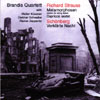Schoenberg & R. Strauss Works for Strings
Richard Strauss’s late Metamorphosen, reduced from 23 to seven strings, appears here in its first version before the composer expanded it to its present larger scale
View record and artist detailsRecord and Artist Details
Composer or Director: Richard Strauss, Arnold Schoenberg
Label: Nimbus
Magazine Review Date: 13/1999
Media Format: CD or Download
Media Runtime: 67
Mastering:
DDD
Catalogue Number: NI5614

Tracks:
| Composition | Artist Credit |
|---|---|
| Verklärte Nacht |
Arnold Schoenberg, Composer
Arnold Schoenberg, Composer Brandis Qt Dietmar Schwalke, Cello Walter Küssner, Viola |
| Metamorphosen |
Richard Strauss, Composer
Brandis Qt Dietmar Schwalke, Cello Rainer Zepperitz, Double bass Richard Strauss, Composer Walter Küssner, Viola |
| Capriccio, Movement: Prelude (string sextet) |
Richard Strauss, Composer
Brandis Qt Dietmar Schwalke, Cello Richard Strauss, Composer Walter Küssner, Viola |
Author: Arnold Whittall
Do you prefer to hear the first chord of Metamorphosen played by five cellos and one double-bass, or by two violas, two cellos and one double-bass? Do you feel that Adagio ma non troppo is a more appropriate initial marking than Andante ? If your answer to both these questions is ‘yes’, you will probably be happy with Strauss’s decision to make his great wartime lament a ‘study for 23 solo strings’, as it was known until 1990, when a draft score of the original version for string septet was unearthed.
Strauss switched from seven players to 23 on receiving a commission from Paul Sacher that made larger forces available, and he never completed a final, polished version of the piece for septet. By and large, the essence of the musical argument is perfectly well conveyed in Rudolf Leopold’s realization, and anyone who finds the version for 23 players a bit too lush to be true might be persuaded that the composer’s first ideas about format were preferable. I wouldn’t go that far, but I was fascinated to hear this excellent performance. The recording conveys an exceptionally rich tonal blend, and this quality is equally apparent in the other works included.
The playing of the Capriccio sextet seems slightly self-conscious in its underlining of expressive nuance, and there is a similar element of caution, of excessive attention to detail, in Verklarte Nacht. Compared to Metamorphosen, this is very much a work of two halves, and it’s the second half which comes off best here, its more connected musical flow finely sustained in a manner that manages to combine discipline and flexibility. The first half has a hothouse feel to it, brooding and weighty to excess. An ideal recording of Schoenberg’s sextet version of Verklarte Nacht is proving elusive, and this one should certainly be heard, alongside the historic 1950 release (listed above). But the disc’s main claim to attention is that fascinatingly intimate Metamorphosen.'
Strauss switched from seven players to 23 on receiving a commission from Paul Sacher that made larger forces available, and he never completed a final, polished version of the piece for septet. By and large, the essence of the musical argument is perfectly well conveyed in Rudolf Leopold’s realization, and anyone who finds the version for 23 players a bit too lush to be true might be persuaded that the composer’s first ideas about format were preferable. I wouldn’t go that far, but I was fascinated to hear this excellent performance. The recording conveys an exceptionally rich tonal blend, and this quality is equally apparent in the other works included.
The playing of the Capriccio sextet seems slightly self-conscious in its underlining of expressive nuance, and there is a similar element of caution, of excessive attention to detail, in Verklarte Nacht. Compared to Metamorphosen, this is very much a work of two halves, and it’s the second half which comes off best here, its more connected musical flow finely sustained in a manner that manages to combine discipline and flexibility. The first half has a hothouse feel to it, brooding and weighty to excess. An ideal recording of Schoenberg’s sextet version of Verklarte Nacht is proving elusive, and this one should certainly be heard, alongside the historic 1950 release (listed above). But the disc’s main claim to attention is that fascinatingly intimate Metamorphosen.'
Discover the world's largest classical music catalogue with Presto Music.

Gramophone Digital Club
- Digital Edition
- Digital Archive
- Reviews Database
- Full website access
From £8.75 / month
Subscribe
Gramophone Full Club
- Print Edition
- Digital Edition
- Digital Archive
- Reviews Database
- Full website access
From £11.00 / month
Subscribe
If you are a library, university or other organisation that would be interested in an institutional subscription to Gramophone please click here for further information.




